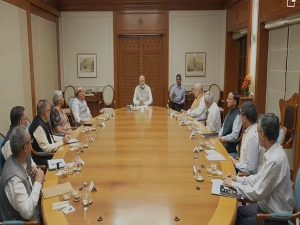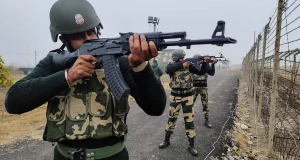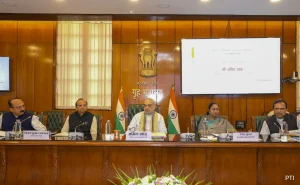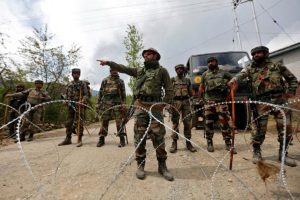New Delhi – The Centre has directed several states to conduct civil defence drills on Wednesday as India-Pakistan tensions escalate following the deadly terror attack in Jammu and Kashmir’s Pahalgam. This development comes amid ongoing exchanges of fire across the Line of Control (LoC) and high-level security meetings chaired by Prime Minister Narendra Modi.
Civil Defence Drills Ordered Amid Rising Tensions
In response to escalating India-Pakistan tensions following the Pahalgam terror attack, the Central government has instructed multiple states to conduct comprehensive civil defence drills. These preparedness exercises come at a critical time as both nations face their most significant diplomatic and military standoff in recent years.

The drills are designed to ensure civilian readiness in case of further escalation in the India-Pakistan tensions. Government sources indicate that the exercises will focus on emergency response protocols, evacuation procedures, and essential services maintenance during crisis situations.
Prime Minister Narendra Modi chaired several high-level meetings at his office on Wednesday to assess the security situation and review strategic options. These meetings included top defence officials, intelligence chiefs, and key cabinet ministers responsible for national security matters.
“The civil defence drills should not be cause for public alarm but rather viewed as standard preparedness measures,” a senior government official stated, speaking on condition of anonymity. “Given the current India-Pakistan tensions, prudent readiness is essential.”
Pakistan’s Continued Provocations Along the LoC
The India-Pakistan tensions have manifested in continued ceasefire violations along the Line of Control. For the eleventh consecutive night, Pakistani forces have engaged in unprovoked firing across multiple sectors. During the night spanning May 4-5, small arms fire was reported from posts opposite several areas in Jammu and Kashmir.


Indian Army sources confirmed that Pakistani forces directed fire toward positions in Kupwara, Baramulla, Poonch, Rajauri, Mendhar, Naushera, Sunderbani, and Akhnoor. The widespread nature of these violations indicates a coordinated effort to maintain pressure along the entire frontier.
“The Indian Army responded promptly and appropriately to the unprovoked firing,” a military spokesperson confirmed. “Our forces remain vigilant and prepared to counter any further provocations as India-Pakistan tensions continue to simmer.”
Also Read: Bangladesh Warns Northeast India Invasion Following Pahalgam Attack
Defence analysts suggest that these persistent violations represent Pakistan’s attempt to distract from international pressure following the Pahalgam attack. The India-Pakistan tensions have drawn concern from global powers, with several nations calling for restraint from both sides while acknowledging India’s right to respond to terrorism.
The Pahalgam Terror Attack: What Happened?


The current India-Pakistan tensions stem from the devastating terror attack that occurred on April 22 in the Baisaran Valley area of Pahalgam, commonly known as “Mini Switzerland” for its scenic beauty. The popular tourist destination, characterized by rolling hills and verdant orchards, became the site of one of the deadliest attacks in recent years.
Terrorists targeted tourists and locals in a carefully planned assault that claimed 26 lives, including one Nepali national, and left many others injured. Eyewitnesses described scenes of chaos as visitors to the picturesque valley found themselves caught in gunfire without warning.
“The terrorists specifically targeted an area known to attract both domestic and international tourists,” noted a senior police official involved in the investigation. “This suggests their intent was to maximize casualties and international attention, further intensifying India-Pakistan tensions.”
The attack occurred during peak tourist season, when the valley was particularly crowded with visitors enjoying the natural beauty that has made Pahalgam one of Kashmir’s premier destinations. The targeting of civilians has drawn widespread condemnation from the international community.
India’s Response and Investigation
Following the Pahalgam terror attack, India has taken a firm stance, vowing to track down and punish every terrorist involved in the massacre. This commitment has been a central factor in the escalating India-Pakistan tensions.
“We will not rest until justice is served for the innocent lives lost in Pahalgam,” declared India’s Home Minister in a statement that underscored the government’s determination. “Those responsible, and those who harbor and support them, will face consequences.”


The investigation into the attack has made significant progress, with intelligence agencies identifying several suspects and their possible connections to terror groups operating from Pakistani territory. This evidence has further fueled India-Pakistan tensions as New Delhi continues to maintain that cross-border terrorism remains a deliberate policy of Islamabad.
Security forces have intensified counter-terrorism operations across Jammu and Kashmir, particularly in areas surrounding Pahalgam. Multiple cordon-and-search operations have been conducted in suspected hideouts, resulting in the detention of several individuals for questioning.
“The attack bears the hallmarks of Pakistan-based terror groups,” noted a senior intelligence official. “The sophistication of planning and execution suggests training and support from across the border, which remains the primary source of terrorism in the region and the root cause of ongoing India-Pakistan tensions.”
Diplomatic Fallout and International Reaction
The Pahalgam attack and subsequent India-Pakistan tensions have triggered significant diplomatic activity. India has briefed key international partners about evidence linking Pakistan-based groups to the attack, while simultaneously raising the issue in multilateral forums.
Several countries have expressed solidarity with India while urging restraint to prevent further escalation of India-Pakistan tensions. The United States, in particular, has called for Pakistan to take “visible and irreversible” action against terror groups operating from its soil.
“We condemn in the strongest terms the terrorist attack in Pahalgam and extend our deepest condolences to the victims’ families,” stated a spokesperson for the UN Secretary-General. “We urge maximum restraint from all parties to prevent further escalation of India-Pakistan tensions.”
Pakistan has denied any involvement in the attack, calling India’s allegations “baseless” and a “typical attempt to divert attention from internal issues.” However, international pressure on Islamabad has intensified, with financial watchdogs maintaining scrutiny over Pakistan’s efforts to counter terror financing.
Looking Forward: Pathways to De-escalation
As India-Pakistan tensions continue to run high, diplomatic channels remain open for potential de-escalation. Third-party mediators, including traditional allies of both nations, have offered to facilitate dialogue if requested by both parties.
Military experts caution that the sustained exchange of fire along the LoC could potentially spiral into a larger conflict if not contained. The civil defence drills ordered by the Centre appear to be precautionary measures in this context.


“While India has every right to defend itself against terrorism, a measured response that targets terrorists while avoiding broader conflict would best serve regional stability,” suggested a former Indian diplomat with extensive experience in India-Pakistan relations.
For now, both nations remain on high alert as India-Pakistan tensions show little sign of abating. The coming weeks will be crucial in determining whether diplomatic efforts can succeed in lowering temperatures while addressing India’s legitimate security concerns regarding cross-border terrorism.
As the situation evolves, civilians on both sides of the border continue to hope for peace even as they prepare for potential challenges arising from the increased India-Pakistan tensions following the Pahalgam terror attack.

